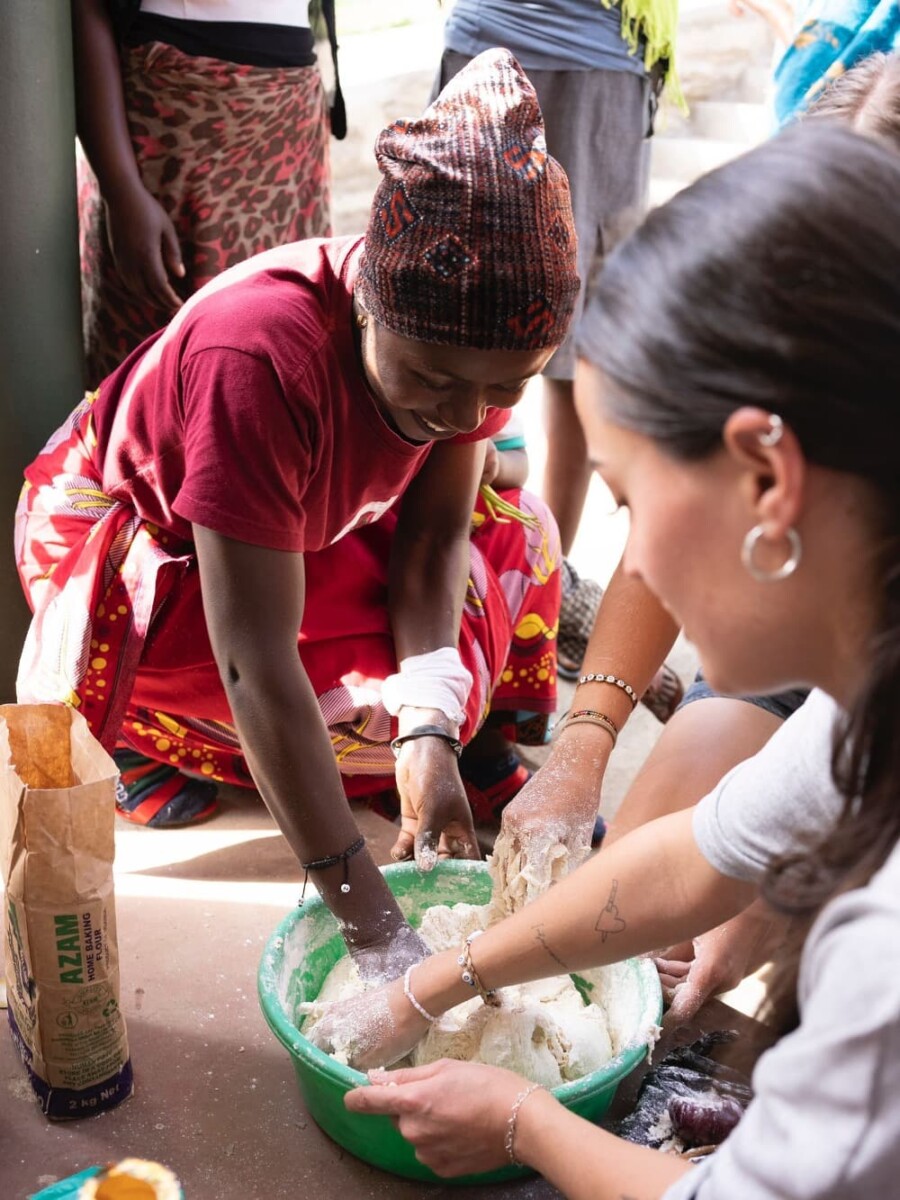Uganda, one of our flagship destinations for experiencing this unforgettable journey, is a country with impressive ethnic diversity. And this is reflected in its culture, customs, clothing, and food…
Eating is one of life’s great pleasures… Who doesn’t enjoy eating and trying new recipes that are completely different from what we’re used to?

That’s why today, we’ll talk about some of the most typical dishes of this country, made with important regional crops like bananas, maize, rice, peanuts, beans, and cassava, among others.
MATOKE
It is a variety of banana essential in Ugandan cuisine, which differs from common bananas in its size, as it is larger, and has thicker skin, and its flavor is not as sweet. It is used in many dishes and is traditionally steamed or boiled, and served mashed. Since it does not have such a strong flavor, it is consumed in both savory and sweet dishes, accompanied by bean sauces, peanuts, or vegetables, or as a side dish with meat and fish.
It is also served during social events and festivals as it is considered a symbol of hospitality and welcome.
POSHO
The main ingredient of this Ugandan dish is maize flour, another of the country’s most popular crops, although sometimes it is also made with millet or sorghum flour. It is very similar to ‘Ugali’ cooked in other parts of Africa, which in this case, is only maize flour.
The preparation of posho is simple, maize flour is cooked in boiling water and mixed until it forms a thick and consistent dough. It is served as an accompaniment to main dishes such as meat in sauces or fish, and is consumed throughout the country.

LUWOMBO
This traditional dish consists of meat or fish, along with vegetables and seasoning, all wrapped in banana leaves and steamed. This way of wrapping the ingredients allows them to cook slowly in their own juices, enhancing the flavors and maintaining the moisture of the food. This dish is considered a festive dish that is usually served on special occasions and celebrations.
CHAPATI
Chapati is a flatbread originating from Indian cuisine but widely used in Uganda and other countries in East Africa. It is made from wheat flour, water, salt, and sometimes a little oil. The dough is kneaded and stretched into thin discs, which are then cooked on a hot skillet until they are golden and slightly inflated. It is eaten alone, or accompanied by main dishes, and sometimes filled to make wraps.
ROLEX
This dish is very typical of street food stalls. It consists of an omelette rolled in a type of flatbread, chapati, and is usually made with eggs, onion, tomato, bell pepper, and sometimes meat or other vegetables can be added. The chapati is placed on top of the ‘tortilla’ and rolled together. This dish is usually very economical and is used for breakfast, lunch, or snacks.
NYAMA CHOMA
This dish consists of grilled meat, usually goat, lamb, or beef, but can also include chicken or fish. The meat is seasoned with local spices and grilled until tender and slightly caramelized on the outside. It is usually served with spicy sauces, fresh salads, and chapati or Ugali. This dish is also very popular at social gatherings and is commonly found in street markets and restaurants throughout the country.
KARIBU NYAMA
It is also a dish of slowly cooked meat seasoned with spices and condiments until it is tender and flavorful. It is also usually goat, lamb, beef, or even chicken. It is cooked with onion, tomato, bell pepper, and sometimes carrot or potato are added. And it is also accompanied by chapati, rice, or Ugali. A curiosity is that ‘Karibu’ in Swahili means welcome, and it is very common to find this dish in Ugandan homes.
PILAU
This dish consists of rice cooked with spices, meat (usually chicken, beef, or lamb), and vegetables such as onion, tomato, and bell pepper. Typical spices include cloves, cinnamon, cardamom, cumin, and turmeric, among others. It is cooked slowly to allow the flavors to blend and absorb into the rice and meat. It is usually served on special and festive occasions, as well as family gatherings and social events. This dish is also eaten in other African and Asian countries.
Without a doubt, we invite you to try all these dishes if you decide that Uganda is the destination you want to visit. It is a way to experience this journey in all its splendor and be amazed by different flavors, and a new culture full of things to offer.



